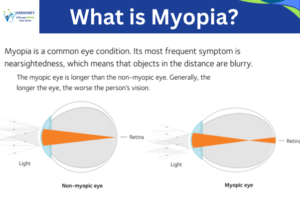Introduction to Myopia
Myopia, commonly known as nearsightedness, is a prevalent vision condition affecting millions of people worldwide. This refractive error makes distant objects appear blurry while close objects remain clear. Understanding myopia, its causes, symptoms, and treatment options is crucial for managing and improving your vision.

What Causes Myopia?
Myopia occurs when the eyeball is too long or the cornea has too much curvature. As a result, light entering the eye is focused in front of the retina instead of directly on it. This leads to a blurred vision of distant objects. Genetics and environmental factors, such as prolonged close-up activities (reading, computer use), can contribute to the development of myopia.
Symptoms of Myopia
- Blurry Distance Vision: Difficulty seeing distant objects clearly.
- Eye Strain: Experiencing discomfort or fatigue in the eyes.
- Headaches: Frequent headaches due to eye strain.
- Squinting: Constantly squinting to see distant objects better.
Expert Care by Dr. Nitu Varshney
At DoctorVarshney.com, we are committed to providing the highest level of eye care. Dr. Nitu Varshney, a renowned ophthalmologist, specializes in diagnosing and treating myopia. With years of experience and expertise, Dr. Varshney offers personalized treatment plans to help patients achieve optimal vision health.
Treatment Options for Myopia
- Prescription Glasses: The most common and simplest solution for myopia. Glasses correct the refractive error, allowing for clear distant vision.
- Contact Lenses: An alternative to glasses, offering a wider field of vision and convenience for many patients.
- Orthokeratology (Ortho-K): Specially designed rigid contact lenses worn overnight to temporarily reshape the cornea, providing clear vision during the day without the need for glasses or contacts.
- Laser Eye Surgery (LASIK): A popular and effective surgical option that reshapes the cornea for permanent vision correction.
- Atropine Eye Drops: Low-dose atropine drops have been shown to slow the progression of myopia in children.
Preventing Myopia Progression
While myopia cannot be entirely prevented, certain lifestyle changes and habits can help slow its progression:
- Limit Screen Time: Reduce the time spent on digital devices and take regular breaks to rest your eyes.
- Outdoor Activities: Encourage children to spend more time outdoors, as natural light and focusing on distant objects can help.
- Regular Eye Exams: Schedule routine eye check-ups to monitor vision changes and update prescriptions as needed.
Why Choose Dr. Nitu Varshney?
Dr. Nitu Varshney is dedicated to providing comprehensive eye care tailored to each patient’s unique needs. Her approach combines advanced technology with compassionate care, ensuring the best outcomes for her patients. Whether you need a routine eye exam, myopia management, or advanced surgical options, Dr. Nitu Varshney and her team are here to help.
